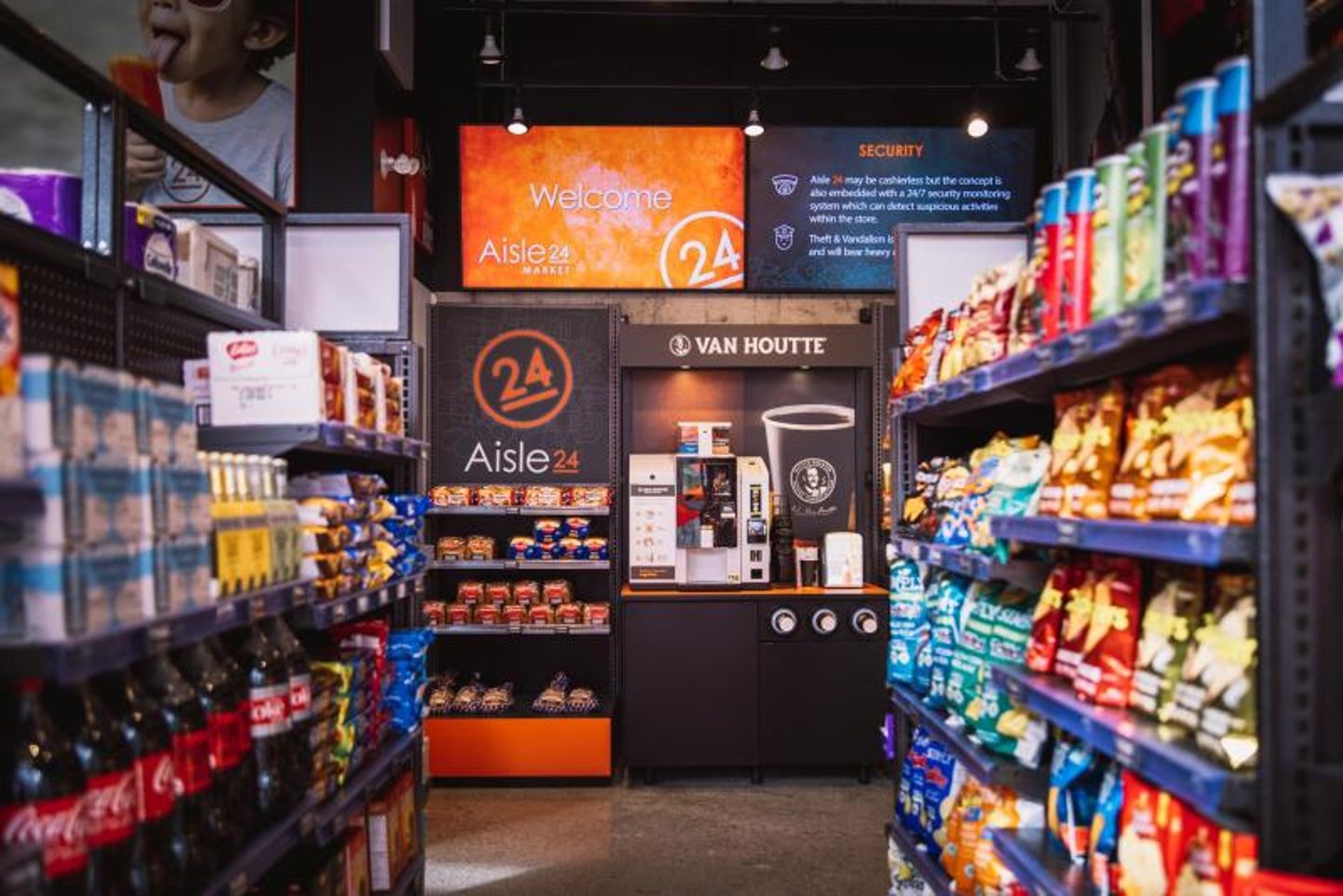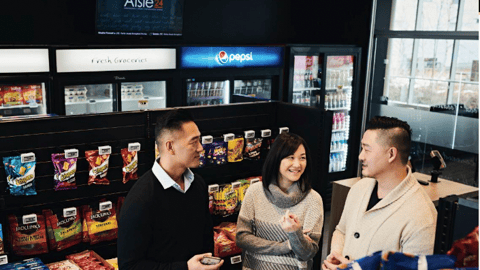Going cashierless: Aisle 24 CEO, John Douang, on the future of retail
Where can you find the future of retail? Look in Aisle 24.
Aisle 24 is an autonomous grocery and convenience store concept that’s open 24/7. Customers use the Aisle 24 app to unlock the door, and when they’re done shopping, check themselves out at a kiosk. The Toronto-based company, which opened its first location in 2016, has grown to 21 locations in residential buildings and retail spaces in Ontario and Quebec, and is rapidly expanding across Canada through a franchise model.
In this Q&A, co-founder and CEO John Douang talks about who Aisle 24 appeals to, what he thinks of consumers’ privacy concerns, and why automation will be the (somewhat distant) future of retail.
Can you tell us about the Aisle 24 concept and what makes it unique in the grocery space?
Aisle 24 is a cashierless, unmanned grocery concept. We fall somewhere in between a convenience store and a small-format grocery store. We carry a lot of different products depending on the market and region we’re in. [In locations that service young families and professionals, for example, Aisle 24 stocks more personal hygiene and home cleaning products, as well as family-sized food products.]But it is open 24 hours a day and it is founded on a technology platform that allows our members to gain access to our stores using our mobile application, anytime they wish. The whole goal around Aisle 24 is to be that uber convenience that allows our customer base to get what they need when they need it, and to carry on with other important things in their life.
How would you describe consumer adoption or acceptance of cashierless stores?
I think people – at least in our target market, which is gen Zs and millennials – are very accepting. They’ve grown up in a digital environment and it only makes sense that in a physical retail environment, there is a digital aspect to it. So, they’re very keen on using this type of service. That age demographic – and I would assume others as well – are short on time and grocery shopping has become a bit of a chore. People want a quick in-and-out experience compared to doing a full week of grocery shopping on a Sunday, which doesn't really happen as often anymore. They’re doing more store visits and buying what they need for a day or two. So, the adoption has been quite good. But, as with any new concept or new business model, there’s always going to be a segment of the population that isn’t yet willing to accept this is the way things are going.
What is your response to people who are concerned about things like automation and privacy, and does that come up?
It definitely does. Now, a lot of the time, [certain retailers] will direct you to self-service. It’s just the way the labour market is trending with challenges in bringing people on the front lines. And so, retailers must have solutions for it. You’ll see it not just in the grocery and convenience industry, but in QSR as well. For example, Freshii has remote cashiers. It’s just a function of the way the market is.
[To the second point], I think people will always generally have concerns around privacy. They want to make sure their information is safe and that it’s not being sold. In our business, we operate in a truly unmanned fashion, so there is an important focus on knowing what is going on within the store and knowing who our customers are. That said, we pay careful attention to the type of information we store within our systems, and we have had several meetings with the Office of the Privacy Commissioner to ensure what we’re building complies with privacy laws. For any company that collects data, whether it’s through a rewards program or past purchase history, it’s in their best interest to take the security of this information very seriously because it can be really damaging to a business [if they don’t].
On that note, is there a data play here for you in terms of using personalization or other loyalty program tactics?
Yes, our goal around a digitized experience for our customer base is the ability to personalize the experience for them. So, things like past purchase history and how often they’re coming play a big role in how we can curate the experience for our customer base. The ones who are more digitally inclined or accepting of this type of business appreciate that. They appreciate the personalization and the ability for us to say, ‘Hey, you’ve purchased milk every week, here’s a discount.’ We can really target it.
What are the biggest challenges for your company?
The challenges we have experienced and continue to face are that demand for Aisle 24 has grown dramatically and we are working through the growing pains of managing that growth. We’ve grown to nearly 100 franchise store grants in less than two-and-a-half years, with dozens of stores in construction or in various lease negotiations. During the pandemic, we did experience some delays in construction, so it was a challenge to build these stores in a quick manner. But we’re always working hard to meet the growing demand we are experiencing.
How do issues get resolved in the store, for example, if a sale item doesn’t ring in correctly?
We funnel communications and interactions with our customer base through our mobile platform. So, we have a live agent they can connect with through the mobile app if they ever have any issues. Most of our engagement takes place through the mobile app, although our customer may run into the franchise or corporate staff who may be in the store. There are things that need to be done that can’t be done remotely, so they’re there on average three to four times per week.
What are your expansion plans?
It’s always been a goal of ours to be a real solidified, entrenched player within the convenience and grocery space. We see a large opportunity, not just in Canada, but in many different regions. The first point of expansion for us outside of Canada is the U.S. and we have been planning for that. With our small format and our ability to go into communities that are new or smaller, and that don’t always meet the financial metrics for other retailers to go in, creates a large opportunity for us. We do see several years down the road that we will have several hundred locations across Canada, and our entry into the U.S. is very important for us right now.
Finally, the million-dollar question: Is autonomous grocery the future of food retail?
It would depend on what timeline you’re thinking. If you say in the next 20 years, as markets evolve and technology increasingly becomes part of everybody’s lives, we are going to see a lot more automation in grocery and in retail in general. Companies will find a way to bridge the gap between traditional retail and e-commerce and digital. E-commerce has been this powerhouse that has been growing every year, but retail hasn’t by any means been going away. It’s still a major percentage of all commerce growth. But retailers need to find a way to digitize the experience, especially for gen Zs who have grown up with this technology. That’s all they know and they will expect to experience that when they’re in the physical world. So, I do believe it is the future… and retailers have to start preparing now for that future.





